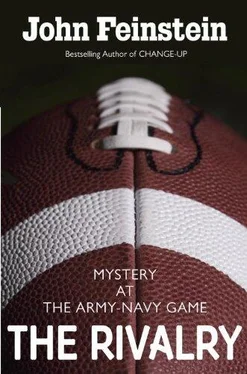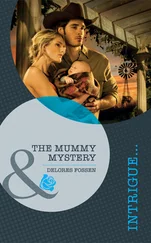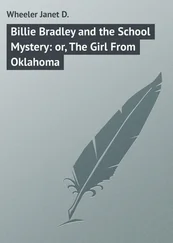They stood for a moment at the edge of Trophy Point. They were high up enough to have a great view down the Hudson River. The campus sprawled on one side, and rolling hills went on for miles on the other. The sun had only been up for about an hour and the air was crisp, but the sky was clear. It would be a perfect fall day for football.
“Pretty spectacular, huh?” Kelleher said.
“Unbelievable,” Stevie answered, meaning it.
They were back in the hotel by eight for breakfast and out again by nine. Kickoff wasn’t until noon, but Kelleher wanted to arrive early to introduce Stevie to various people in the press box.
Before that, though, they stopped at a tailgate party that was held right outside the Holleder Center, where Army’s hockey and basketball teams played. Even though he had just eaten, Stevie found the smell of grilling hamburgers irresistible.
“Go ahead,” Kelleher said, seeing the look on Stevie’s face. “You’re still a growing boy.”
“I wish I was growing faster,” Stevie said.
He was waiting for his hamburger when someone behind him said, “Well, if it isn’t my biggest fan.”
Stevie recognized the voice instantly but was still surprised to see Duke basketball coach Mike Krzyzewski standing with another legendary basketball coach, Bob Knight, and Pete Dowling, the Secret Service agent.
“Coach K., you remember me?” Stevie said.
Krzyzewski laughed. “Remember you? If it weren’t for you and Susan Carol Anderson, I’d have another national championship.”
Stevie felt himself turning red. “Well, you know, Coach, we were just trying-”
“To do the right thing,” Krzyzewski broke in. “And you did. Wouldn’t want it any other way.”
“Stevie, I’d like you to meet Bob Knight,” Krzyzewski said, realizing that Stevie was a bit tongue-tied. “And this is Pete Dowling…”
“We met last night,” Dowling said.
Knight, who was wearing one of his signature sweaters with an ESPN-his current employer-logo on it, shook hands with Stevie and said, “You’re an aspiring sportswriter, I hear.”
“Yes, sir.”
“So I take it, then, that you’re not very bright. Are you going to just stand there all day or are you going to let someone else eat around here?”
Now Stevie was really tongue-tied.
“Coach, I thought we had a deal that you wouldn’t start beating up on reporters until they’re at least twenty-one,” Krzyzewski said, making a joke of it. “Stevie, could you ask for three more hamburgers?”
“Um, sure,” Stevie said, and signaled for three more to the guy at the grill. “What brings you up here?”
“Girls’ field hockey,” Knight answered.
Stevie knew that Knight was famous for being brusque, often going out of his way to be rude to reporters. He had risen to fame while winning three national titles and getting into all sorts of trouble at Indiana. He had finished his career at Texas Tech, and Stevie had read that he had become a kinder, gentler curmudgeon since going to work as a commentator on TV. It didn’t seem quite that way at the moment.
Krzyzewski forced a laugh. “What Coach meant to say is, the Army Hall of Fame induction dinner is tonight. We both coached at Army early in our careers, and we each have a former player going in. That’s why we’re here.”
“And we hired Agent Dowling for the day to protect us from kids who are media wannabes and budding sycophants,” Knight added.
“Well, you don’t need protection from me,” Stevie shot back. “I’m strictly a newspaper guy, so ESPN is the last place I’d ever work.” He was about to congratulate himself for remembering from his eighth-grade vocab class what a sycophant was when he saw the look on Krzyzewski’s and Dowling’s faces and the definition flew out of his mind. Oh my God, I just talked back to Bob Knight!
“You’ve got some mouth on you, don’t you?” Knight said.
Fortunately, the guy grilling the hamburgers intervened at that moment. “Got four fresh ones here,” he said, handing them to Stevie, who quickly passed them around.
“I’m sorry-” Stevie started to say.
“That’s actually a point,” Krzyzewski said. “You are in the media now, Coach.”
“I need something to drink with my burger,” Knight said. “Let’s go.”
“I’m going to stay here for a minute with Steve,” Dowling said. “Coach Knight, it was an honor to meet you. I hope I see you later.”
He shook hands with both coaches, who turned into the crowd and were instantly mobbed. Maybe they did need Secret Service protection.
“Pretty gutsy line there, Steve,” Dowling said as he picked up his hamburger.
“I can’t believe I said that,” Stevie said.
“Yeah.” Dowling laughed. “He may be seventy, but he’s a big guy with a temper.”
“No kidding,” Stevie said. “What were you doing with them?”
“I met Coach K. years ago when he brought his team to the White House after winning a national title,” Dowling said. “He’s signed things for charities for me and for my kids. Good guy.”
“I know,” Stevie said glumly. “My friend Susan Carol loves him and everything Duke. I can’t stand Duke, but whenever I’ve met him, he’s been really nice.”
“Class act,” Dowling said. He looked at his watch.
“Are you working?” Stevie asked.
“Soon,” Dowling said. “I’m going to meet with the officiating crew when they get here. Some of them will work Army-Navy, so I want to brief them.”
“I guess that’s a break for you if some of the same guys work both games,” Stevie said.
Dowling shook his head. “No, it’s not. We requested it. Three officials from this group and four from the Navy-Notre Dame game will call Army-Navy.”
“No detail overlooked, huh?” Kelleher said, walking up to join them.
Dowling shrugged. “That’s the plan.” He glanced at his watch again. “I’m sorry, I’ve gotta go,” he said. “Stevie, keep an eye out for Coach Knight.”
Stevie laughed.
Kelleher gave him a look as Dowling walked away. “Did you get yourself into trouble again?” he asked.
“Only a little,” Stevie said.
Kelleher shook his head. “Come on, let’s get inside the stadium. Maybe you’ll be safe in there.”
Watching the game from the sidelines was thrilling for Stevie. He was amazed by how fast the players moved and by how hard they hit one another. You really didn’t see that on TV. Several times when plays came close to where he and Kelleher were standing, he winced at the sound of the contact being made and fully expected the players to remain lying on the ground. And yet they jumped up and ran back to their huddles.
“My mother was right about one thing,” he said late in the first quarter. “This is not a game I should play.”
He and Kelleher had been joined by two men who knew a lot about football injuries: Tim Kelly, the Army team trainer, and Dean Taylor, a former team doctor who now worked at Duke.
“I’m an Army alum,” Taylor said when Kelleher introduced him. “Class of ’81. I’m back for the Hall of Fame dinner too.”
“He has to keep an eye on Coach K.,” Tim Kelly joked. “Anything happens to him and they probably shut Duke down tomorrow.”
“True enough,” Taylor said.
Taylor had an easy, friendly smile and seemed pretty laid-back-except when calls went against Army.
When a punt hit a Georgia Tech player on the leg and Army fell on it, the packed stadium erupted. But the officials ruled the ball hadn’t hit the Tech player and awarded the ball to the Yellow Jackets.
“How in the world can forty thousand people see something and all seven of you miss it completely?” Taylor railed at the side judge, who was standing only a few feet away as Georgia Tech lined up. “What are you looking at, the scenery?”
Читать дальше












